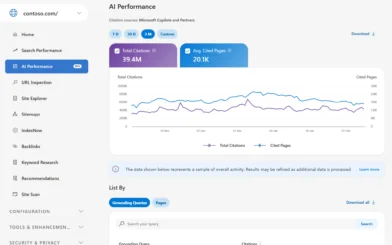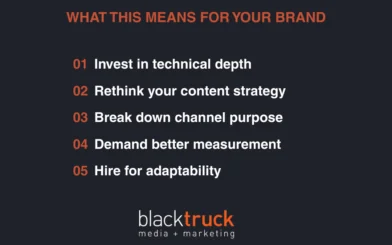When was the last time you actually picked up a phone book to use, not toss in recycling or stack under your monitor for proper ergonomics? If you are of a certain generation the answer is going to be never. Whether you like it or not, we live in a digitally connected world where we can research, schedule, and conduct business from nearly any location while on the go.
Just this year, mobile searches eclipsed those of their desktop counterparts. In an official release, Google stated that “50% of all searches are performed by a mobile device,” while a study from Hitwise argues that number is actually greater at 58%. Of those searches, over 50% of them have local intent.
Granted those percentages will certainly fluctuate based on the industry you look at. The data however is pretty compelling and to put it into context just consider how many searches you might perform from your mobile device in any given day. No matter the industry you are in, we can argue that you will benefit from some level of local SEO.
What is Local SEO?
Local SEO strategies are an effective way of promoting your goods and services to customers within a geographical region. Many of the local search results are backed by data from what we refer to as “citation sources.” Citation sources are simply any mention of your business online, and in this case we are focused on those at the local level.

Courtesy of Moz Local
Common Local Citation Sources
Most common local citation sources include Google My Business, Bing Places for Business, Yelp, and even Facebook. Depending on your business, there could in fact be other citation sources and even business directory listings that could be beneficial to your site. You’ll want to look for those listing opportunities that align with your business, organization. Word of caution here, do make sure they are relevant to your business and respected in the online space.
Take a N.A.P.
Actually falling asleep at the wheel of your local SEO is exactly opposite of what we want you to do. If you have taken the steps to secure your company’s listing on a few of the sources listed above, it’s time you took a N.A.P.
The acronym, N.A.P., actually refers to Name, Address and Phone Number. These three elements are the base reference point for nearly any local search, and also are one of the major problem areas for businesses trying to improve their local presence. Reviewing these elements to uncover inconsistencies and duplications could be the difference between winning and losing customers at a local level. Use these tips to help elevate your local search presence.
Name – This doesn’t necessarily have to be the legal name of your company, but the name that is used everywhere. Details are everything. For us at Black Truck Media + Marketing we even trip ourselves up with the naming conventions used.
Believe it or not, there is a distinct difference between BlackTruck Media + Marketing vs. Black Truck Media + Marketing. If our company name is listed as BlackTruck (one word) on Google, and Black Truck (two words) on Facebook, we have a problem. Those inconsistencies will not only trip up your potential customers, but definitely will trip up a search engine. All of the sudden the search engine is left to make the decision between how your brand should be displayed, which is right and which is wrong. Take action!
Address – Some might argue this is almost more important than your company’s name. With nearly all mobile devices tracking based on their real-time location, having the proper address is key. Our suggestion is to use the official address for your building, including suite number, that has been provided and/or verified by Google or USPS. Word of caution here, they may not always be the same naming convention. Your landlord might say it’s Suite B, but Google and USPS knows it as STE B, we recommend going with STE B.
The address you are using, the one that gets verified on the citation sources, should also be the one used on your website itself. Go through and make sure you are using the same address across all sources. If you moved recently, address clarification takes on an even larger roll. Go through the process of updating those EXISTING listings. Do not go in and create a new listing just because you moved. This is a sure fire way to create duplications and nobody has time for that.
Phone Number – No shocker here that we’re going to tell you the same thing we did with Name and Address. The phone number associated with your business and used on your corporate website is the one you should be using in local listings. We highly recommend you use your local number. For us it’s a 616 area code and not an 800 or 855 toll free service.
Those who are independent consultants, contractors etc. and don’t want their mobile phone number indexed, do yourself a favor and sign up for a Google Voice number. This gives you a local area code telephone number that can be used on all of your collateral and just gets forwarded to your phone. Instant infrastructure that is also well optimized!
Automated Local SEO Services
Yes there are Local SEO services out there that will make claim that they submit to hundreds, if not thousands of sources. This still does not do all the legwork of sorting out your name, address and phone number. These tools are just aggregators of that data to help you find your flaws and inconsistencies. A must for businesses with many listings and/or a large number of locations. Premium resources out there like Moz Local and Yext are two of them found to be pretty invaluable, especially here in the United States. While we have our opinion on both, we’ll let you decide if, and which tool is right for you should you choose to do so.
Understanding we have simply scratched the surface of Local SEO strategies and could go on and on about categories, images, etc. we’ll leave you with the basics. Take time and understand IF you have your listings secured and verified. Then look for inconsistencies and start cleaning those up. Search engines and users will thank you.



